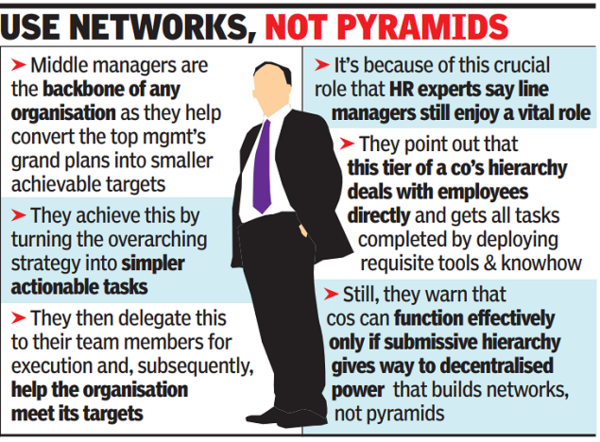Why Middle Managers Are Crucial For Company Success And Employee Well-being

Table of Contents
Bridging the Gap: Middle Managers as Communication Catalysts
Effective communication is the bedrock of any thriving organization, and middle managers play a pivotal role in ensuring its seamless flow. They act as vital communication catalysts, bridging the gap between upper management and frontline employees. This two-way communication stream is essential for organizational health and success.
- Translating complex strategies into actionable plans: Middle managers translate high-level strategic goals into clear, concise, and actionable plans for their teams, ensuring everyone understands their role in achieving company objectives.
- Gathering and relaying employee feedback to senior leadership: They serve as a critical conduit, gathering valuable feedback from employees and relaying it to senior leadership, ensuring that the voice of the workforce is heard.
- Ensuring transparency and open communication within teams: Middle managers foster a culture of transparency by openly communicating company updates, decisions, and changes to their teams. This open communication helps prevent misunderstandings and fosters trust.
- Addressing concerns and resolving conflicts efficiently: They are often the first point of contact for employee concerns, mediating disputes and resolving conflicts efficiently to maintain a productive and positive work environment. Effective conflict resolution is a key skill for successful middle managers.
Driving Performance: Middle Managers as Productivity Powerhouses
Middle managers are instrumental in driving productivity and efficiency within their teams. Their ability to effectively manage performance contributes significantly to the overall success of the organization.
- Setting clear goals and expectations: They establish clear, measurable, achievable, relevant, and time-bound (SMART) goals, ensuring every team member understands their individual contributions to overall objectives.
- Providing regular performance feedback and coaching: Consistent feedback and coaching help employees improve their performance, identify areas for growth, and stay motivated. This proactive approach boosts productivity.
- Delegating tasks effectively and monitoring progress: By effectively delegating tasks and monitoring progress, middle managers ensure workloads are distributed fairly and projects stay on track, maximizing team efficiency.
- Identifying and addressing performance bottlenecks: They proactively identify obstacles hindering productivity and implement solutions to streamline workflows and remove roadblocks.
- Implementing best practices and improving work processes: Middle managers champion the adoption of best practices and identify opportunities to optimize work processes, improving overall team efficiency and productivity.
Fostering a Positive Work Environment: Middle Managers as Employee Champions
A positive and supportive work environment is crucial for employee well-being and organizational success. Middle managers play a critical role in cultivating this environment. High employee morale directly contributes to higher productivity and retention rates.
- Mentoring and supporting employees' professional development: They act as mentors, guiding and supporting employees' professional growth through coaching, training opportunities, and career development discussions.
- Recognizing and rewarding employee contributions: Regularly acknowledging and rewarding employees' achievements boosts morale and fosters a sense of appreciation, increasing employee engagement.
- Promoting teamwork and collaboration: They cultivate a collaborative team spirit by facilitating effective teamwork and communication, fostering a positive and supportive atmosphere.
- Addressing employee concerns and providing solutions: By actively listening to employee concerns and seeking solutions, they demonstrate empathy and build trust, fostering a sense of psychological safety.
- Creating a culture of trust and respect: Middle managers establish a foundation of trust and respect by leading by example and treating all team members fairly and equitably.
Strategic Implementation: Middle Managers as Executors of Vision
Middle managers are the vital link between high-level strategic goals and their on-the-ground execution. They ensure that the company's vision translates into tangible results.
- Adapting company strategies to specific team needs: They tailor company-wide strategies to the specific needs and circumstances of their individual teams, ensuring relevance and practicality.
- Monitoring progress towards strategic objectives: They closely monitor progress towards strategic objectives, identifying potential roadblocks and making necessary adjustments to stay on course.
- Identifying and mitigating potential risks: Proactive risk management is crucial, and middle managers play a key role in identifying and mitigating potential risks that could hinder progress.
- Making data-driven decisions to optimize performance: They utilize data and analytics to make informed decisions, optimizing team performance and contributing to overall company success.
- Contributing to overall company success: Their effective execution of strategic plans significantly contributes to the overall success and growth of the organization.
The Untapped Potential of Middle Managers: Investing in Success
In conclusion, middle managers are indispensable to both company success and employee well-being. Their roles in communication, productivity, fostering positive work environments, and strategic implementation are critical. By understanding their vital contributions and investing in their development, organizations can unlock significant improvements in company performance and employee satisfaction. Empowering your middle managers through targeted training and development programs is an investment that yields substantial returns. Developing effective middle management is not just about improving individual performance; it's about building a stronger, more resilient, and more successful organization. Invest in your middle management team and watch your company flourish.

Featured Posts
-
 Exploring The Tech Gravel Bikes Big Tyres And Smart Design At Paris Roubaix 2025
May 26, 2025
Exploring The Tech Gravel Bikes Big Tyres And Smart Design At Paris Roubaix 2025
May 26, 2025 -
 Live Streaming Moto Gp Inggris Race Sprint Jam Tayang 20 00 Wib
May 26, 2025
Live Streaming Moto Gp Inggris Race Sprint Jam Tayang 20 00 Wib
May 26, 2025 -
 The F1 Drivers Press Conference Key Moments And Controversies
May 26, 2025
The F1 Drivers Press Conference Key Moments And Controversies
May 26, 2025 -
 Wounds Visible In Photo Of Kidnapped Israeli Soldier Matan Angrest
May 26, 2025
Wounds Visible In Photo Of Kidnapped Israeli Soldier Matan Angrest
May 26, 2025 -
 Massive Rubber Duck Brings Important Message To Myrtle Beach
May 26, 2025
Massive Rubber Duck Brings Important Message To Myrtle Beach
May 26, 2025
